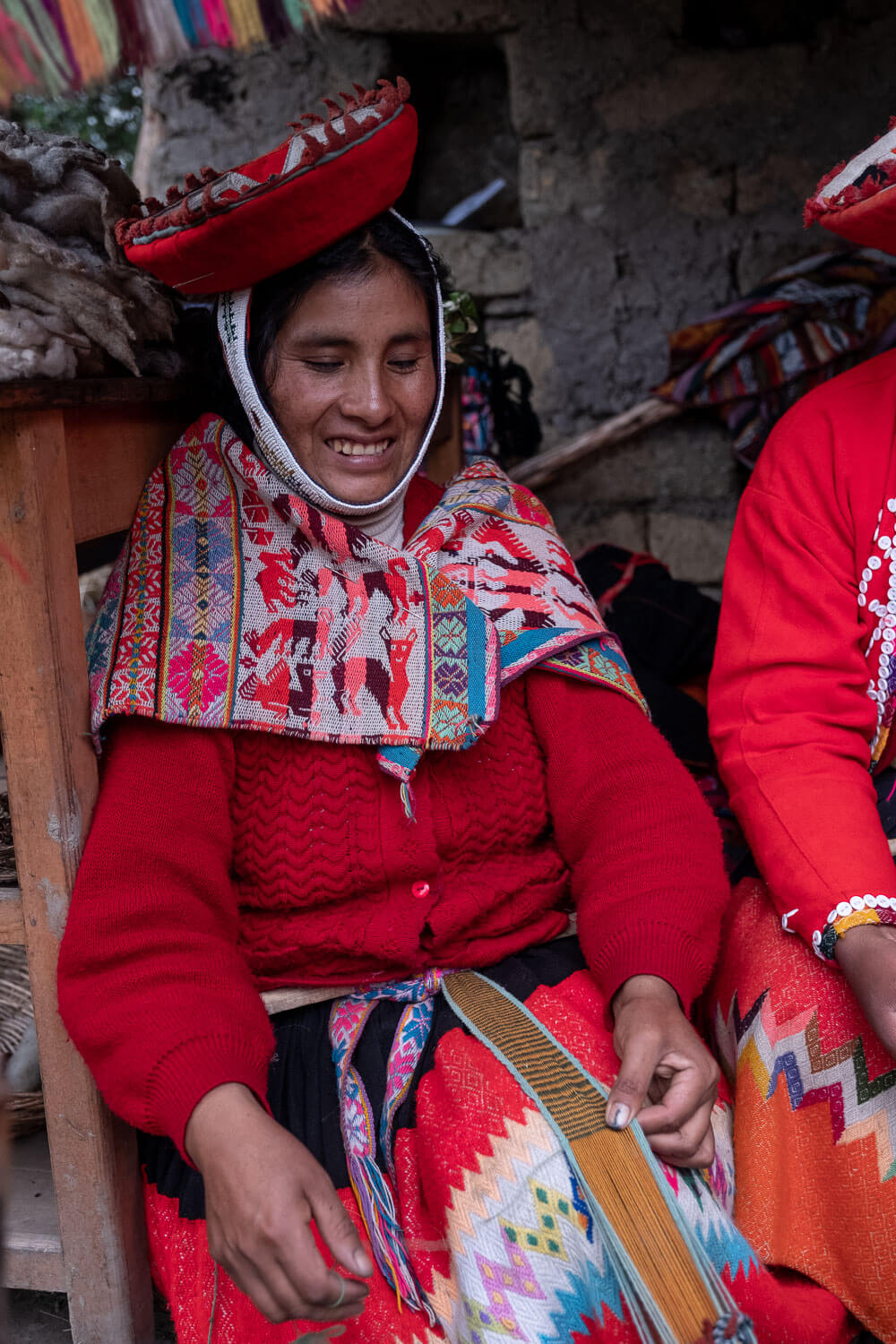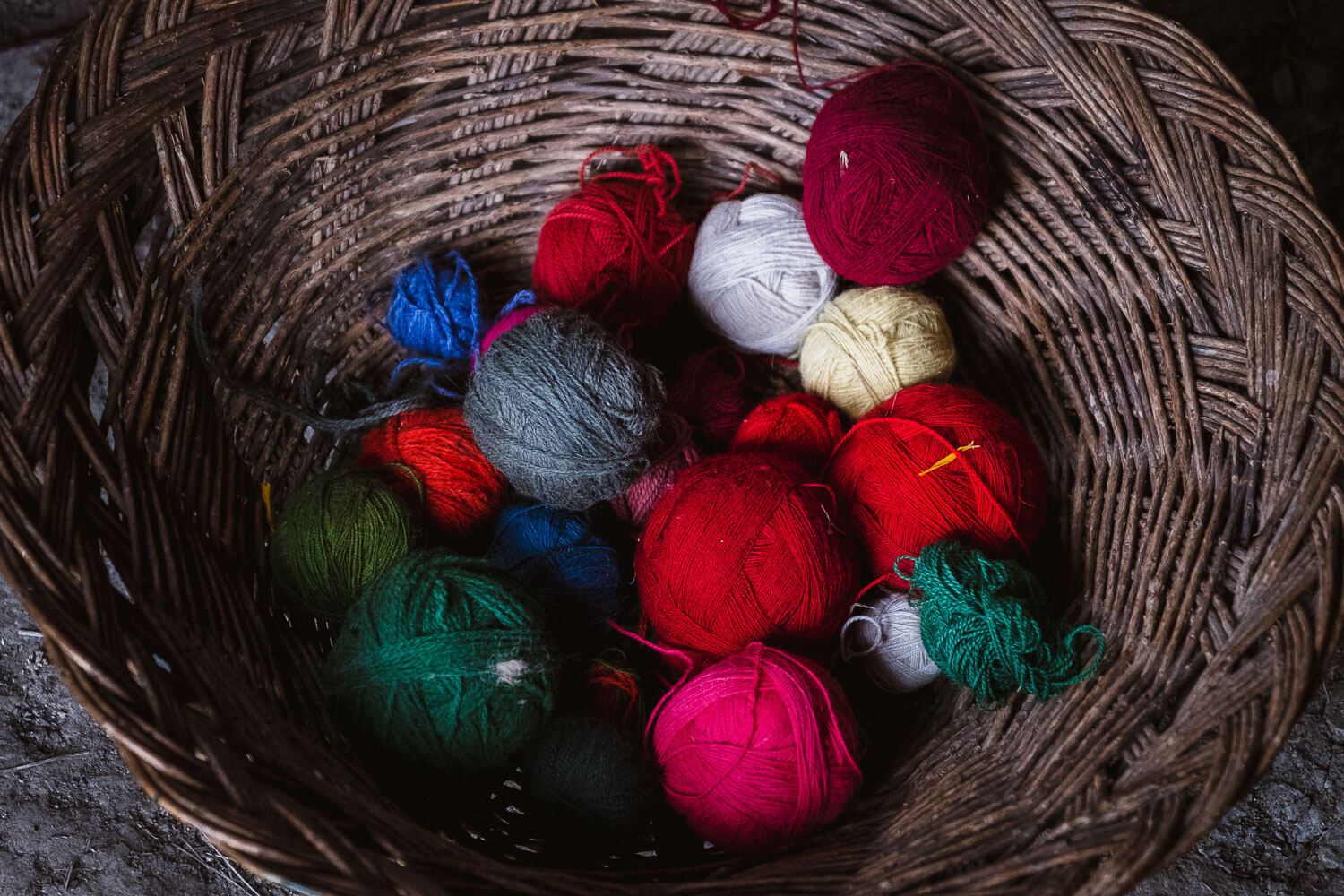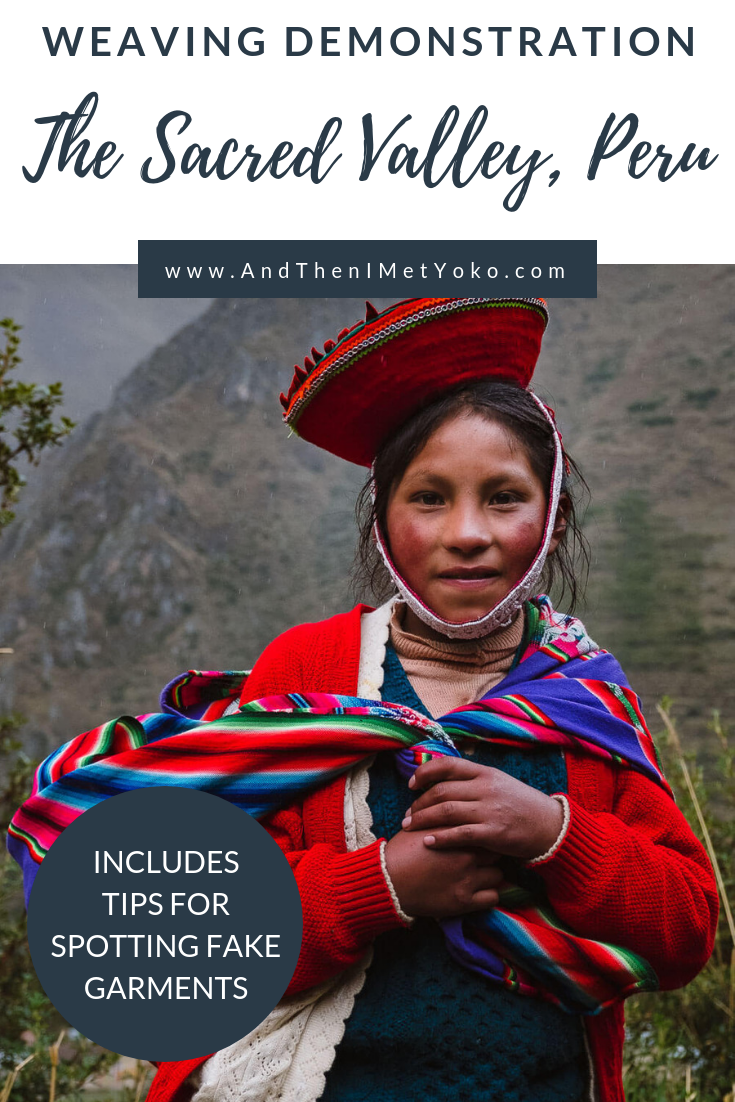Experience Textile Making With the Peruvian Weavers of Patacancha
4,200 meters above sea-level, tucked away in the Andes, is the village of Patacancha. Within the village is a small community of women weavers.
These Peruvian weavers, have mastered skills passed on through generations but with the rise of cheaper, machine-made alternatives, they’re struggling to keep their Inca traditions alive.
There are several weaving communities in the Sacred Valley region but Patacancha is remote, meaning the weavers see less tourism.
We spent a few hours with the community, learning about their ancient-weaving techniques.
Getting to Patacancha
The drive to Patacancha from Ollantaytambo lasted about 40 minutes. At every turn, another beautiful landscape would unfold. We climbed, up and up, looping around mountains, passing small villages, and lush valleys with streams.
It’s easy to appreciate the distance that these communities have to travel in order to reach larger areas of commerce. I was embarrassed when I lost my breath just by walking up a small hill.
Meeting our hosts
The people of Patacancha greeted us with open arms. They played music, and dressed us with ponchos, skirts and hats. I immediately got a closeup view of their craftsmanship.
We were then invited into their house for some tea, potatoes and cheese. At such a high elevation there isn’t much that grows in the way of agriculture, so tubers (potatoes) are a staple in the diet. The community was so gracious to share some with us.
We peeled the skin off the potato and paired it with some coca tea. This is served a lot in the Andes to help battle altitude sickness.
Communicating with a Quechuan Community
Like many communities in Peru, this one was Quechuan, meaning they spoke Quechua, a dialect that dates back to the Incas, before the Spanish invaded. Luckily a few people within the village spoke Spanish and we relied heavily on our guide to break the language barrier. Even without words it was easy to feel their warmth and kindness.
Planning to visit Peru? Check out my 2-week itinerary to Peru.
The Weaving Demonstration
The demonstration took us through the many stages of weaving. First we saw and touched the hair. We were able to feel the difference between llama, alpaca and vicuña hair. Each one, respectively softer than the next. Doing this helped make sense of the price differences between the final garments found in the markets.
The first, and most time consuming, step in the process is turning fibers into the actual yarn. Once the fibers are washed, they’re spun on a drop-spindle using your finger. The turning motion of the spindle tightens the fibers to form the yarn.
Once the yarn is ready, it’s time to dye it. The weavers get their dyes from local plants and insects creating tints of yellow, red, green and blue. It’s surprising to see so many colours come from natural sources.
Dying the yarn
The dye is mixed with boiling water and the yarn is put inside the pot. It’s then left for varying amounts of time. The longer it stays, the darker the colouring will be, creating a huge array of shades.
The weaving process itself is trickier. We watched as the women made belts, creating rows within seconds. We all got to try the technique by finishing some already-started friendship bracelets.
Purchasing from the weavers in Patacancha
After the demonstration, we were shown several pieces for purchase. I told them the colours I preferred and they shared some options with me. I now own a beautiful handwoven table runner.
Seeing the entire process meant I was able to appreciate the workmanship. Like a fine wine, or a Swiss watch, I was happy to purchase a quality piece that was helping to keep traditions alive.
While there were pieces for all budgets, it’s important to remember that the prices will be steeper than what you will find in most markets. This reflects the fact that they’re handwoven and not machine-made.
Enjoy cultural experiences? Consider spending a night at a homestay on an island in Lake Titicaca.
My final thoughts on my visit to Patacancha
I thoroughly appreciated our visit with the weavers in Patacancha.
Like many ancient traditions, handweaving is threatened by modern-day challenges. In a world of fast-fashion, it's easy to purchase more, for less. But this mentality comes at a price.
Synthetic fabrics and dyes are detrimental to our ecosystem and the constant need for cost cutting has put people’s livelihood at stake. Weavers are not alone, as many garment workers throughout the world work without fair wages. To top it off the majority of these workers are women, creating an even greater disparity in income between genders.
It was nice to see a young generation embracing weaving. I hope that if we, as consumers, think differently about how we purchase, then traditional art forms like this will survive.
Schedule a visit to Patacancha
I had a fantastic guide, Carlos, who’s based in the Sacred Valley and Cusco. He was able to translate and made sure everything went smoothly.
Carlos is offering a 10% discount to all my subscribers. Sign up to receive the discount code.
How to tell the difference between REAL and Synthetic garments?
Shopping for garments in Peru can be overwhelming. There’s different fibers and weaving techniques making it easy to overpay if you’re not trained to tell the difference.
Here’s a few tips for deciphering between machine-made vs. handmade garments and real alpaca vs. synthetic fibers.
Natural Colouring
Generally, if the colours are vibrant they’re synthetic. Remember that the handwoven pieces are made with natural dyes, so they won’t be florescent or shiny if you hold them up to the light.
Inperfect Patterns
Think about it, handwoven items have small defects and discrepancies, the lines won’t be perfect and this is what makes the piece unique. If something looks too good, it’s likely made by a machine.
Check The Ends
The next picture shows two “alpaca blankets”. One is made from real alpaca fibers and the other isn’t. Look at the finishing on the ends. The blanket on the left, has loose ones which is a sign of synthetic, versus the right blanket, which has knotted ends and is real alpaca.
Touch The Fabrics
Alpaca wool will feel cooler than synthetic fibers, it’s also heavier.
Higher Price Points
Synthetic blankets will cost around 60 soles, while real ones will be closer to 130 soles. When shopping it’s best not to commit to anything when you first see it. Walk around and come back later if you’re really interested.



































The ultimate Peru itinerary - 2 weeks exploring highlights in Lima, Huacachina, Cusco, The Sacred Valley, Lake Titicaca, Arequipa and of course, Machu Picchu. This photographic travel guide comes with travel tips to help with planning.